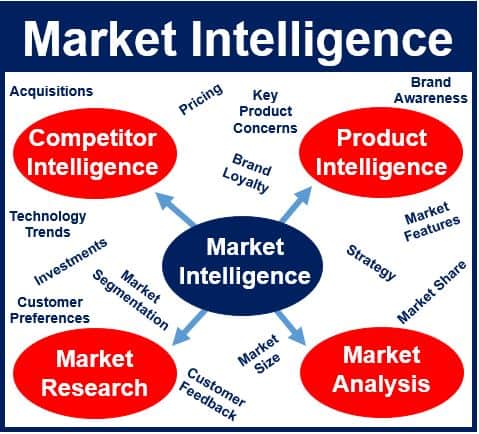Market intelligence refers to data that a business gathers about a market. It includes, for example, information about competitors, customers, and suppliers. Companies say that by analyzing market intelligence, they can make more effective business decisions.
‘Intelligence’, in this context, means data or information. When it appears next to the word ‘Market,’ it becomes a compound phrase – ‘Market Intelligence,’ which refers to gathered and analyzed information about the market.
In these five compound phrases, the word ‘Intelligence’ also means information gathered, analyzed, and used to guide decisions: competitive intelligence, strategic intelligence, customer intelligence, cyber intelligence, and operational intelligence.
Helps make decisions
Market intelligence helps companies determine internal goals, and where to devote more resources. It also helps decide which markets to break into next, and what products could be cross-marketed to existing customers.
According to specialists, market intelligence covers four major activities:
- Competitor intelligence – learning about competitors’ weaknesses and strengths in a legal and ethical manner. Industrial espionage is illegal!
- Product intelligence – gathering and analyzing data regarding the performance of a product a company is designing. Also doing the same for products that it is manufacturing.
- Market analysis – determining factors, conditions and features of a market. Studying the attractiveness and dynamics of a specific market.
- Market research – the process of determining how viable a product or service is in a market. We do this through techniques such as product testing, surveys, and focus groups. If something is ‘viable,’ it is capable of generating profits year after year. Market research also includes gathering information about consumers’ needs and preferences.
Each of these four areas is a discipline in and of itself. Their data and analyses become extremely useful and powerful when we integrate them.

According to ft.com/lexicon, market intelligence is:
“Information that a company gathers about a market, such as information about its customers and competitors.”
Market intelligence – an example
For example, through product intelligence, you may learn that a rival is pricing a product below its normal pricing range. You may also learn that it plans to replace it with a completely new product soon.
Your competitor intelligence people report that the rival’s board of directors has challenged the Chief Executive Officer. He or she must increase market share. This could involve strategies to break into a new market segment.
By integrating data from the four areas, you conclude that the rival plans to gain a larger customer base. Specifically, it wants to do this before launching the new product. Hence, the price reduction.
Put simply; it plans to gain market share before launching its new product. Market share refers to total sales in relation to the whole market.
You and your team will have a better idea, through market analysis and market research, whether the rival’s strategy is likely to succeed or will simply become a drain on resources.
Gathering all the data is one thing. However, turning it into meaningful information that you can easily understand and act upon is quite another. To do this requires a certain level of expertise.
According to Pragmatic Marketing, a company specialized in helping businesses create more effective marketing strategies:
“The ultimate test of the data and the analysis is whether it provides the right information in order to let the decision makers make decisions with confidence.”
Video – What is market intelligence?
This Marketing Business Network video explains what market intelligence is and all of its components.
